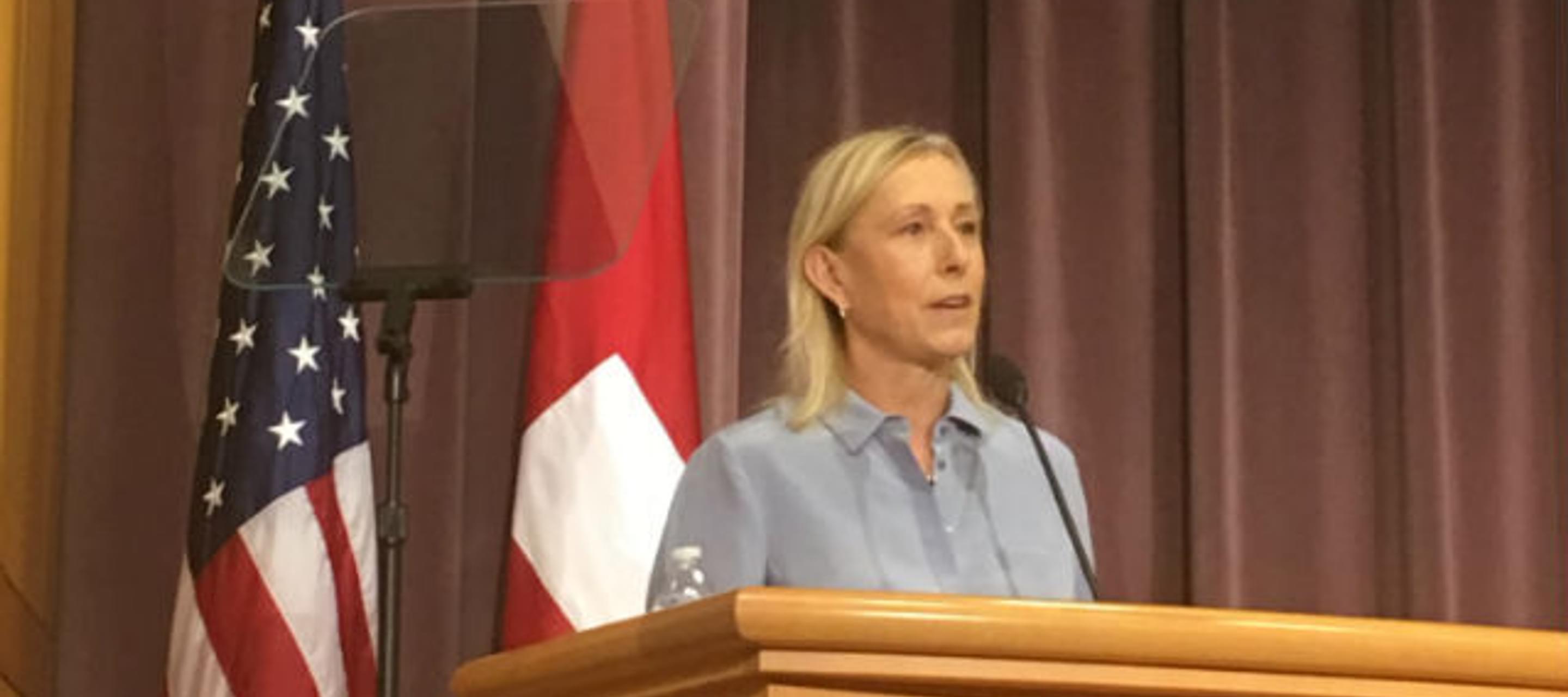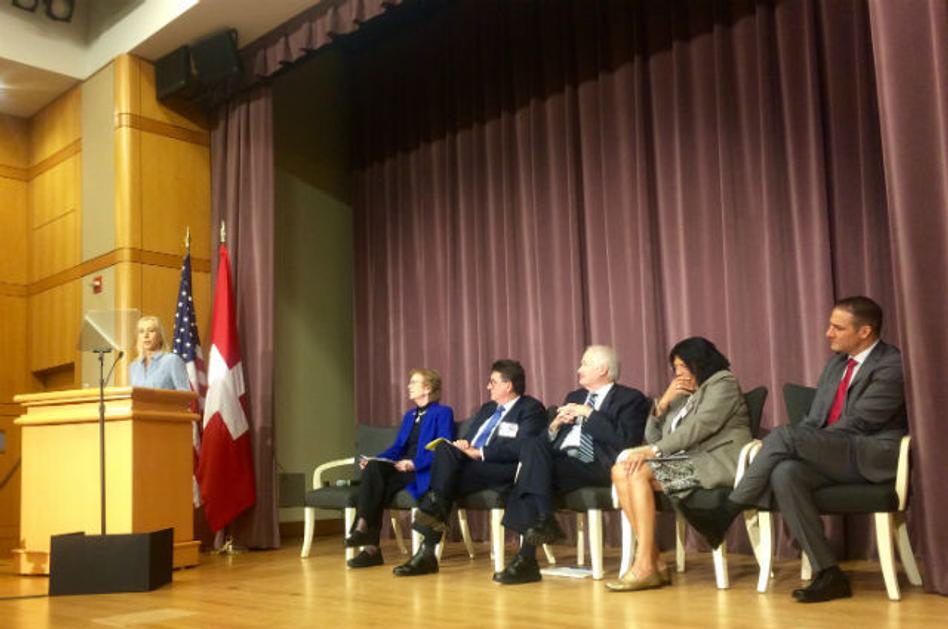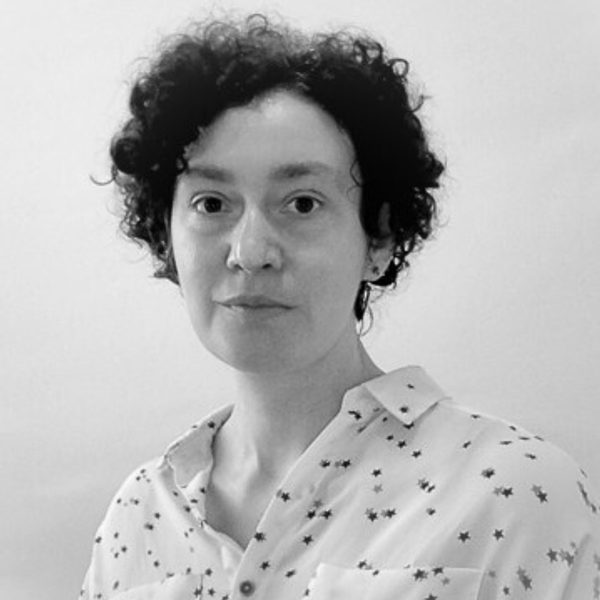Speech by Martina Navratilova at Sporting Chance Forum
13 October 2016

Delivered on 13th October 2016 at the Sporting Chance Forum, co-hosted by IHRB, the US Department of State and Swiss Federal Department of Foreign Affairs. Watch the recording here.
"Thank you for inviting me to this important and timely conference. My understanding is that this is the first major summit on this topic with such strong representation from sports federations, governments, sponsors, unions, rights advocates—and athletes. A special thank you to our hosts at the United States Department of State.
To see so many influential organizations and individuals come together to champion diversity and human rights is amazing, because it is not simply tolerating people of difference. It is celebrating us.
I am grateful for the opportunity to “serve up” some framing remarks as an athlete, as a fan of sports, and as an advocate for equality and diversity on and off the playing field.
I will speak first about the importance of diversity and upholding basic human rights as mega-sporting events are carried out. Then I would like to outline my vision for how sports and leadership from sports federations can play a positive role in changing the world.
What we have seen with events like the Olympics or the World Cup is that they bring prestige and power. Leaders and governments very much want the honor of hosting. Mega-sporting events can bring job creation, improved infrastructure and a spotlight on the benefits of sports participation and healthy living. Because events are awarded 7-10 years in advance—imagine if that period was used to meaningfully improve human rights and the lives of local populations?
But too often, mega-sporting events, with their long lead times, have brought a high human cost, a high cost for workers, for journalists, for children, for the whole local populations. Sporting events that could have celebrated diversity, gender equality, LGBT rights, and people living with disabilities, have, in some critical ways, dropped the ball.
Today, there are more than 76 countries where being LGBT is punishable by fines and arrest. Our most recent Olympics in Rio had over 200 athletes competing who could be put to death if their governments found out they were LGBT. And when only .4% of the 11,000-plus athletes competing in the Olympics felt comfortable being out, this tells us that our sports governing bodies and those countries that host their championships must do more to protect their athletes and must do more with respect to the rights of the LGBT community.
Let me give an example of my personal reaction when I learned that Russia was passing a national anti-gay “propaganda” law in advance of the 2014 Sochi Winter Olympics. As an athlete from that part of the world and as a woman who has family in the region, the law—and its intent to stigmatize and exclude—hit very close to home. It made LGBT athletes, fans and Russian citizens feel unsafe.
It was the opposite of what the Olympic ideals stand for and what the modern Olympic movement should represent.
That moment helped me evaluate some principles that should be central to any discussion of reform. I hope these can help shape your discussions over the next two days:
- I believe that sport has the power to change the world.
- I believe that sport should be safe and accessible for all.
- I believe that when sport is not safe and accessible for all, there is a responsibility to do something about it.
The principles of sport, as set out in the Olympic Charter, require sports governing bodies to promote and defend human rights.
If a sporting event is displacing a community without compensation, the local actors may be to blame—but it is the responsibility of the sport governing body to do something about it.
If the construction of stadiums for mega-sporting events is subjecting workers to unsafe conditions resulting in injury or even death, it is the responsibility of the sport governing body to do something about it.
If women are being systematically denied access to a sporting event or stadiums, it is the responsibility of the sport governing body to do something about it.
I believe that hosting mega-sporting events is an honor. It is not a right. If a country wishes to host a mega-sporting event, then these hosts must be prepared to abide by the expectations of those sport governing bodies which are giving them that honor.
If we can agree that our sporting communities believe in the principles of equality and in the advancement and protection of human rights, then any country wishing to host a mega-sporting event should be prepared to put those principles into practice—from the very beginning of the bid process all the way through to legacy, after the closing ceremony fireworks display.
How would that work in practice?
My hope is that this summit will result in three things:
First, is that those individuals, organizations and activists present here today work together to apply comprehensive human rights standards to the bidding process for every mega-sporting event.
To host the Olympic Games or the World Cup or the World League Volleyball Championship, a host country should start by demonstrating respect for the human rights principles that underpin the Olympic Charter.
I can tell you that athletes don’t want to compete in a stadium where workers lost their lives building it. Event hosts should have a plan to show that they will not arrest journalists, destroy the environment, displace communities, or neglect local populations that will most certainly be affected.
These human rights standards should not only address those things which we hope to avoid or mitigate, but also encourage the many ways a mega-sporting event can positively impact the countries and communities.
My second hope is that these standards are agreed and adopted.
This shouldn’t be too hard: the human rights rules we are talking about are ones that most host governments and companies have already signed up to through the United Nations.
There have been many efforts by organizations and activists for years to encourage a rights-respecting approach to large sporting events and federation governance.
But for the efforts of this summit to be truly successful, we need every sport governing body to commit to the same human rights standards. So long as there is a patchwork of protections, we will continue to have mega-sporting events that fail to protect and respect human rights.
My third hope is that we can work together to create mechanisms for accountability. In order to transform our sporting events into becoming the forces for good that I know they can be, we need our sport governing bodies themselves to be accountable.
To create accountability, we first need transparency. If the international human rights community cannot properly assess and measure to what extent mega-sporting events are not protecting and respecting human rights, then we will not be able to enforce the standards we are fighting for.
After transparency comes action. When a country is given the honor of hosting a mega-sporting event and then chooses not to protect and respect human rights, there must be consequences. There must be sanctions and even the potential of losing that mega-sporting event to another country.
In the United States we have seen the NCAA and NBA move All-Star games and championships because of anti-LGBT legislation in that particular state. It's not easy but this can be done. There is no reason why there shouldn’t be similar consequences for those host countries that refuse to practice the principles of equality.
While I would hope that these actions come easily, I know from experience that they often do not.
This is why we also need our journalists to cover events with rigor, and why we need the major sponsors to help create that accountability. Without sponsorships there would be no events- so yes, the sponsors do have that power. If those people in positions of power do not do their part to keep our sport governing bodies and mega-sporting event hosts accountable, then we will be having these same conversations 50 years from now.
In my experience, great athletes, great role models, great business leaders always have a basis for action. In the face of change and challenges they must make the tough choices, get involved in correcting injustices, and be accountable for the outcome. And this is where leaders have to come in. Leaders who inspire. To quote a friend of mine, the wonderful Madeleine Albright, "leaders who inspire not only take us where we want to go, they take us where we ought to go."
In 1975, I had to make the biggest decision of my life – to leave the former Czechoslovakia, now the Czech Republic, because I was ashamed of the then-Communist regime. I didn’t know if I’d ever see my family again. That, my friends, was pressure. But I had a vision for my life that if I left the repression of my homeland, I could really become the champion I knew I could be. After six years of living without a country, I found a home and was granted US citizenship in 1981. But those 6 years were really hard - I felt like I didn't belong anywhere. And believe me when I say this - this is still what millions of people feel like today - like they don't belong because of who they are. We must do better for them, for us.

Pictured from left: Martina Navratilova, Mary Robinson (former President of Ireland and former High Commissioner for Human Rights), Greg Vines (Deputy Director-General, International Labour Organization), Donald Fehr (President, UNI World Athletes), Anita DeFrantz (Executive Board Member, International Olympic Committee), David Grevemberg (Chief Executive, Commonwealth Games Federation)
When you have an authentic vision, things happen. When you have clarity about your vision, you discover yourself being pulled toward it, and all you have to do is follow the connecting opportunities and principles that carry you along.
As a woman and a member of the WTA I fought for equal prize money at all the Grand Slams, just wanted to get paid the same as the guys. That fight started in the early 70's but it wasn't until 2007 that we finally achieved it. Come to think of it, I think I am owed a few dollars back pay... As I said - it wasn't easy, it took a long time, but we got there.
In other sports today, there are some parallels to that fight. And it's not about money, but it is about equality.
Around the world, access to sport and the venues that hold them, is not universal. LGBT athletes may choose not to participate because of existing sports cultures. Women and girls in sports are still underrepresented and under-resourced. There are officials who believe that women playing or even watching sport is a crime, that women shouldn’t be able to ride a bicycle or cheer volleyball in a stadium.
Needless to say in those places women can't play the sport at all... Athletes and fans with disabilities may not have access to proper equipment or facilities. And millions lack access to sports because of the financial barriers of traveling, training, competing or just simply participating.
Indeed, many of the dozens of countries with discriminatory laws, where LGBT people still live in fear, crave the opportunity to host mega-sporting events, and the prestige that comes with it. Unfortunately some of these countries still get the OK to host these prestigious mega events. Imagine if your work here over the next two days could help ensure access not only to sports, but to human rights worldwide?
This vision—my vision—is a positive one shaped by my own experience. I believe that sport can help drop the hurdles to human rights, that the Olympic Charter’s prohibition on LGBT or gender discrimination could ultimately be a catalyst for reform and change, outside of the sporting arena, all around the world.
So I ask you to arrive at reforms that will make a difference—do everything you can do to ensure that every athlete, employee and fan can be safe, can be their authentic selves, on their field of play, in the stands, and can and will have equal protection under the law.
We have come a long way in a relatively short time when it comes to all basic human rights. But not having those equal rights and protections feels like a really really long time when you are the one on the short end of this equation.
However, the fact that we are talking about this now, the fact that we are talking about the LGBT community without people gasping or booing or recoiling in horror is a huge step forward. But, we still have a long way to go.
When I retired from being a tennis champion, I retired from tennis, but I didn’t – and never will – retire from being a champion of human rights. Retirement would mean settling for what we have now and that is not enough for me. I don’t think it’s enough for you either. And it truly is great that now there so many of us speaking out, so many of us doing our part to give everyone a fair chance, to give everyone an equal opportunity and to give everyone a guarantee of a safe place, where we can be just who we are- nothing more and nothing less.
Thank you."




